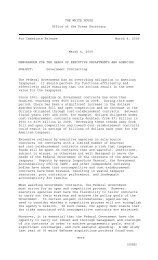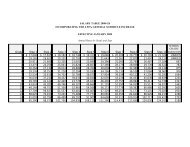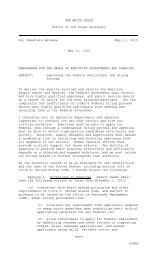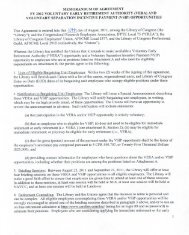Accenture's fifth annual global e-government study
Accenture's fifth annual global e-government study
Accenture's fifth annual global e-government study
You also want an ePaper? Increase the reach of your titles
YUMPU automatically turns print PDFs into web optimized ePapers that Google loves.
Kingdom and the Netherlands share ninth place; and<br />
Ireland, Japan and Belgium share 11th place. Even<br />
among those countries that do not share a ranking,<br />
the differences are minor. A slip in rankings, then,<br />
is not as telling as other data. More interesting is<br />
a comparison of countries’ growth patterns (see<br />
Figure 2), along with an analysis of what these<br />
countries’ plans are for future improvement.<br />
Overall, eGovernment maturity has risen dramatically<br />
since the year 2000. For most countries, the most<br />
rapid advances occurred during the early years of<br />
their eGovernment programs. This trend is not surprising,<br />
given the “quick-hit” opportunities that were<br />
available to all initially. Figure 2 shows how progress<br />
has slowed for most countries, particularly within the<br />
past two years.<br />
The rise and fall in the rankings of some countries<br />
against a backdrop of no real stellar performances—<br />
or obvious missteps—points out clearly how<br />
eGovernment plateaus happen. Countries that do<br />
not progress fall behind those that continue to make<br />
steady progress. At a certain point, a course of action<br />
reaches the limits of its utility and a lackluster<br />
eGovernment program yields no additional value.<br />
Consider the countries in this middle group of<br />
maturity (50 percent to 60 percent) as an example<br />
(see Figure 3). Germany and Belgium both experienced<br />
drops in overall rankings. Both countries<br />
continued implementation of an early eGovernment<br />
plan and neither made the kind of transformational<br />
changes that would have propelled them to a higher<br />
stage of maturity.<br />
However, Germany recently has refined the strategic<br />
elements of its eGovernment plan. In particular,<br />
Germany articulated a Deutschland Online vision<br />
and a new action plan that truly focuses on integration.<br />
This reassessment may provide Germany<br />
with the starting point for a new upswing in<br />
growth. Likewise, Belgium has hit a plateau after<br />
two years of strong growth and a rapid rise through<br />
the rankings. However, the country has been quietly<br />
making improvements to a number of back-end<br />
eGovernment enablers that may set the stage for<br />
a burst of improvement on the customer-focused<br />
end in future years.<br />
Denmark will be another interesting country to<br />
watch over the course of the next year. Like Belgium<br />
and Germany, it too experienced minimal growth<br />
Figure 3: Growth rates: 50 percent to 60 percent overall maturity<br />
a. Overall maturity 56%–60%<br />
25<br />
b. Overall maturity 50%–55%<br />
25<br />
20<br />
20<br />
15<br />
15<br />
10<br />
10<br />
5<br />
5<br />
0<br />
0<br />
Y2001<br />
OM Change<br />
Y2002<br />
OM Change<br />
Y2003<br />
OM Change<br />
Y2004<br />
OM Change<br />
Y2001<br />
OM Change<br />
Y2002<br />
OM Change<br />
Y2003<br />
OM Change<br />
Y2004<br />
OM Change<br />
Australia<br />
France<br />
Belgium Japan Average<br />
Denmark<br />
United Kingdom<br />
Germany<br />
Netherlands<br />
Finland<br />
Average<br />
Ireland<br />
Norway*<br />
*Although Norway’s overall maturity is slightly below 50 percent, it is included here to highlight the similarities in its growth pattern to the Netherlands.<br />
9













